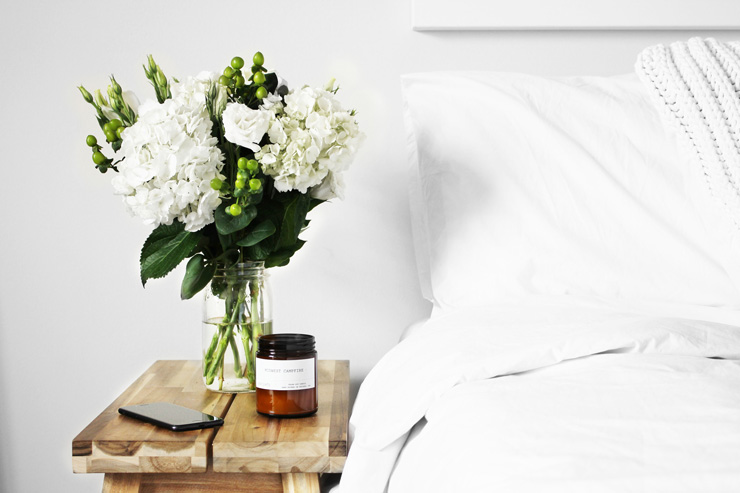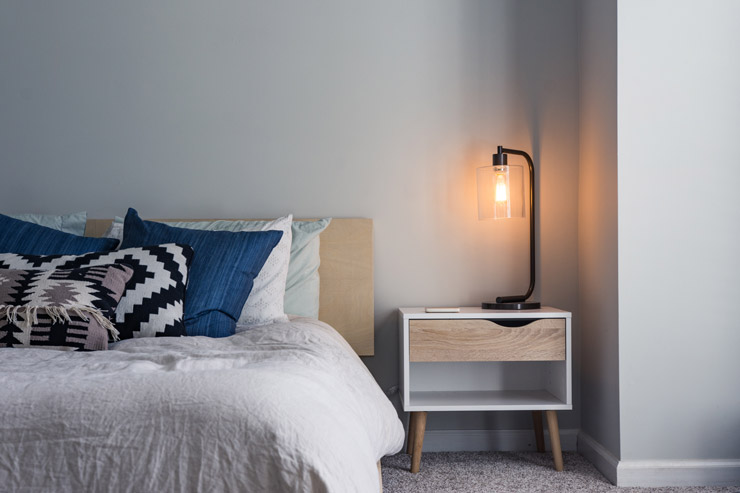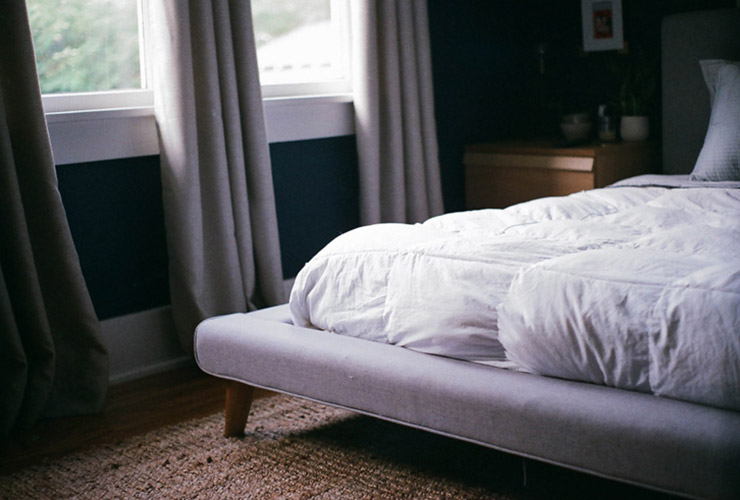
Smart, informed décor choices combined with mindful bedroom hygiene will help ensure you get the deep, restorative sleep your mind and body need
—
If you’re anything like me, you long for deep, sound sleep — preferably as much of it as you can possibly get. As it turns out, a healthy and safe bedroom is ideal for achieving excellent sleep, night after night. My Fitbit sleep score has improved since I implemented the following bedroom comfort tips. Enjoy!
Avoid anything that compromises breathing
Even slight interruptions to deep, regular breathing patterns can interrupt your sleep — maybe not enough so you really notice it or wake up, but enough to prevent you from enjoying as much deep sleep as you really need. To avoid this, pick hypoallergenic furnishings and keep your bedroom immaculately dusted and vacuumed. Since mattresses and pillows are havens for dust mites, be sure to clean them thoroughly. (Here’s a helpful resource on just how often you should clean your mattress and household items.) You can also add protective dust mite-resistant covers or choose a mattress and pillows that have built in protection. If your pets sleep with you (which can be relaxing and great for getting lots of quality sleep), be sure that they’re as clean as can be.
Block out light
Since even a little bit of light can prevent you from resting well, you’ll want to block as much light as possible. Blackout shades keep streetlights and headlights from intruding into your cozy haven. If you can, keep electronics stowed in another room or in a drawer where lights won’t bother you. Choose an old-fashioned non-illuminated alarm clock over a digital one for even more deep, restful darkness.

Prioritize mattress quality
In a perfect world, we’d all spend a minimum of 8 hours per night sound asleep. Given the demands of modern life, most of us get a whole lot less. This means that the sleep we actually do get needs to count. If you don’t look forward to settling in for the night, or if your bed leaves you feeling stiff and sore in the morning, it could be time to shop for a new mattress. There are tons of excellent options to choose from; make time to read some thoughtful and reliable mattress reviews like the ones on Sleeping Culture before shopping.
Turn down the thermostat
Sleep experts give differing opinions about the perfect temperature for falling asleep quickly and staying that way, but most agree that a slightly cool temperature is best — somewhere between 60 and 67 degrees, or perhaps the low 70s if you’re someone who prefers to sleep ‘warm’.
Choose natural textiles
Textiles that contain petrochemicals and other additives are not ideal for your health. While your favorite fuzzy blanket probably doesn’t pose a hazard, you might want to gradually swap your bed linens for natural cotton, preferably organic since it isn’t treated with scary pesticides and herbicides. For duvets, comforters, and pillows, choose a down alternative if you can. Choose feather-free if you’re concerned about animal welfare. Another reason to choose a different filling for your comfy bedding is that while natural down feels great, it’s notorious for harboring microbes. To save money while creating a unique look in your bedroom, consider sewing your own quilt or knitting / crocheting your own blankets. Yes, it’s a labor of love, but you’ll be in charge of all the materials that go into your special bedding.

Use area rugs instead of wall-to-wall carpeting
Style and cleanliness come together when you choose beautiful area rugs for your bedroom. Unlike wall-to-wall carpeting, you can clean under them, vacuum them, have them professionally cleaned if needed. Rugs will keep any carpet you do have cleaner, so layer them on top if tearing out your old flooring isn’t really an option. Be sure to choose an extra-fluffy one for your bedside — it feels fabulous on your feet!
Pick someplace else to watch TV
We talked about the issue with light in general, but blue light — the kind that comes from phones, computers, and TV screens – really messes up your circadian rhythm which prevents you from quickly falling asleep. Most advice recommends ending your screen time about an hour before bed, not watching TV in the bedroom at all, and reserving your bedroom as a sanctuary purely for sleep and intimacy. It might take some time to build different screen habits, but you’ll enjoy deeper, healthier sleep as a result.

Wash your sheets at least once a week
Even though you shower regularly, you still leave sweat and skin cells behind when you get out of bed in the morning. Since microbes and dust mites love to feed on dead skin cells and other detritus, it’s vital to keep your bed super clean and fresh. Change your sheets once a week at a minimum, or every few days for even cleaner sleeping.
You may also enjoy reading Sacred Space…Sacred Home: Creating a Mindful Sanctuary by Elena Kilkeny